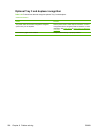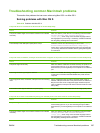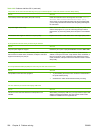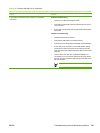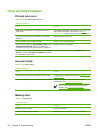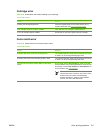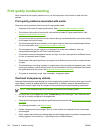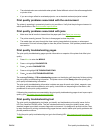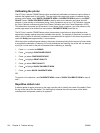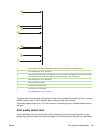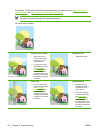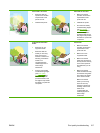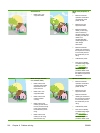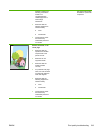
Calibrating the printer
The HP Color LaserJet CP4005 Series printer automatically calibrates and cleans at various times to
maintain the highest level of print quality. The user might also request the printer to calibrate via the
printer’s control panel, using QUICK CALIBRATE NOW or CALIBRATE NOW located in the PRINT
QUALITY menu. QUICK CALIBRATE NOW is used for color tone calibration and takes about 65
seconds. If color density or tone seems wrong, Quick Calibration can be run. Full Calibration includes
the Quick Calibrate routines and adds Drum Phase Calibration and Color Plane Registration (CPR).
This takes about 4 minutes and 20 seconds. If color layers (black, magenta, cyan, and yellow) on the
printed page seem to be shifted from one another, CALIBRATE NOW should be run.
The HP Color LaserJet CP4005 Series printer incorporates a new feature to skip calibration when
appropriate, thereby making the printer available more quickly. For example, if the printer is turned off
and on quickly (within 20 seconds), calibration is not needed and is skipped. In this case, the printer will
reach the Ready state approximately 1 minute sooner.
While the printer is calibrating and cleaning, the printer will pause printing for the amount of time it takes
to complete the calibration or cleaning. For most calibrations and cleaning, the printer will not interrupt
a print job, but will wait for the job to complete before calibrating or cleaning.
1. Press Menu to enter the MENUS.
2. Press
to highlight CONFIGURE DEVICE.
3. Press
to select CONFIGURE DEVICE.
4. Press
to highlight PRINT QUALITY.
5. Press
to select PRINT QUALITY.
6. Press
to highlight QUICK CALIBRATE NOW.
7. Press
to select QUICK CALIBRATE NOW.
OR
To perform a full calibration, use CALIBRATE NOW instead of QUICK CALIBRATE NOW in steps 6
and 7.
Repetitive defect ruler
If defects repeat at regular intervals on the page, use this ruler to identify the cause of the defect. Place
the top of the ruler at the first defect. The marking that is beside the next occurrence of the defect
indicates which component needs to be replaced.
214 Chapter 8 Problem solving ENWW



